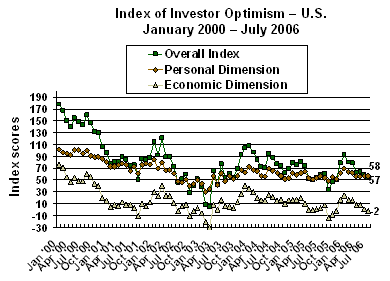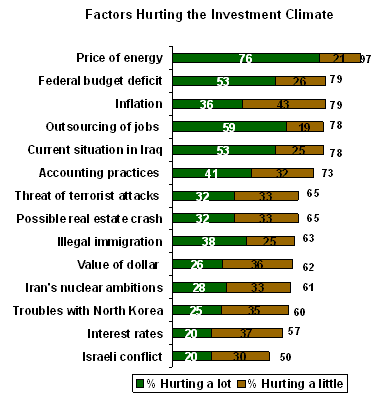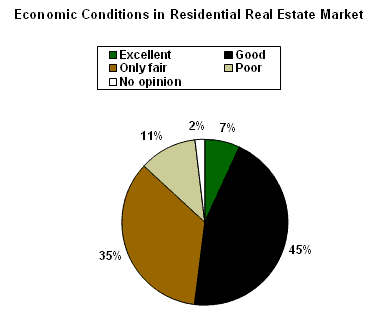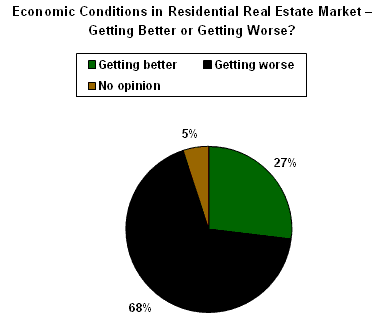GALLUP NEWS SERVICE
PRINCETON, NJ -- Investor optimism continued to decline in July, reaching its lowest point of the year according to the July UBS/Gallup Index of Investor Optimism. While the Personal Dimension of the Index was unchanged in July, the Economic Dimension turned negative, suggesting that investors as a whole have turned pessimistic about the economic outlook for the year ahead. The last time investor optimism was this low was in November 2005, as the economy was working through the negative impact of last year's devastating hurricane season.
Investor Optimism Continues to Decline in July
July's Index of Investor Optimism is 55, down from 58 in June and 64 in May. The Index is down 38 points from January's 93 rating, falling 13 points in February and 16 points in May before dropping another 9 points over the past two months. The Index had a baseline score of 124 when it was launched in October 1996.
With the Personal Dimension static at 57 in July from June, and essentially the same as the 56 of May and April, investors continue to be about as optimistic concerning their own investment portfolios as they have been over the past couple of months. In this regard, it is interesting to note that investors expect to achieve a double-digit average rate-of-return on their portfolios over the next 12 months.
In contrast, the Economic Dimension fell to -2 in July from +1 in June and +8 in May, suggesting that investors as a whole are pessimistic about the economic outlook over the next 12 months. The Economic Dimension has declined steadily this year, tumbling a total of 26 points since January. The last time investors were this pessimistic about the economic outlook was over the period of September to November 2005, during last year's devastating hurricane season.

Investors Have Many Worries
Energy prices continue to be of particular concern to investors, with 97% saying energy prices are negatively affecting the U.S. investment climate -- 76% say energy prices are "hurting a lot," and 21% say they are "hurting a little." Investors are also greatly concerned about the unsettled geopolitical environment; 78% say they are worried about the current situation in Iraq, 65% are concerned about more terrorist attacks, 61% are worried about Iran's nuclear ambitions, and 60% are concerned about troubles with North Korea. Although much of the survey was conducted prior to the recent conflict in Lebanon, 50% of investors say they are concerned that the clash between the Israelis and Palestinians will hurt the U.S. investment climate.

Housing Is Key to a "Soft-Landing"
The housing market is another area of concern for investors; 65% say they believe the potential for a housing or real estate crash in some local markets is hurting the investment climate. And while 52% of investors rate conditions in the residential real estate market nationwide as "good" (45%) or "excellent" (7%), almost half rate conditions as "only fair" (35%) or "poor" (11%).

More significantly, 68% of investors say economic conditions in the residential real estate market nationwide are getting worse, as opposed to 27% who say they are getting better.

Of course, the key issue for the U.S. economic outlook is not whether the real estate sector will slow, but rather, how bad will the slowdown be. A moderate slowdown could decelerate the overall economy while still permitting the Federal Reserve Board to maneuver a so-called "soft-landing." On the other hand, given the clear lending excesses in the housing sector, a sharp drop in housing activity could lead to severe consumer credit problems and full fledged recession.
Right now, it is not clear what the ultimate fate of the residential real markets in the U.S. will be in coming months. But no one should underestimate the ramifications of a housing sector collapse.
Survey Methods
Results for the UBS/Gallup Index of Investor Optimism poll are based on telephone interviews with 801 investors, aged 18 and older, conducted July 1-16, 2006. For results based on the total sample of investors, one can say with 95% confidence that the maximum margin of sampling error is ±4 percentage points.
